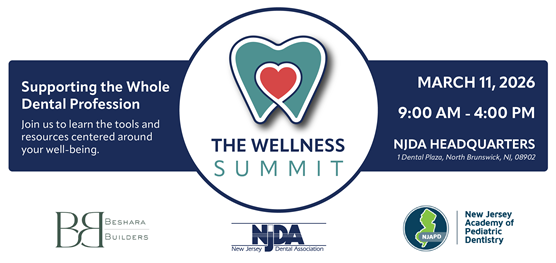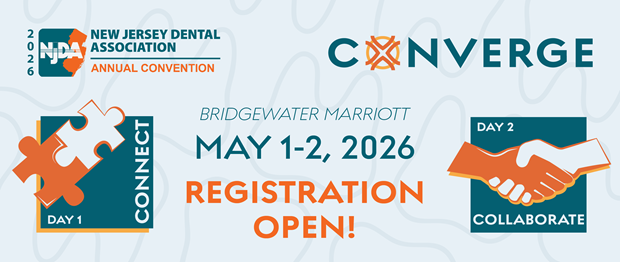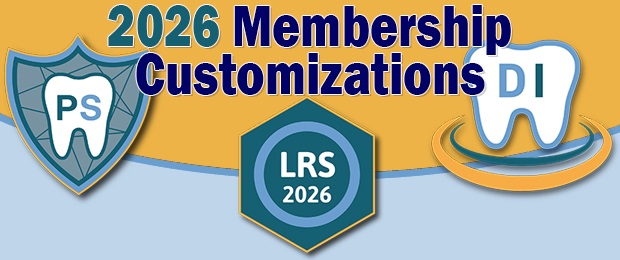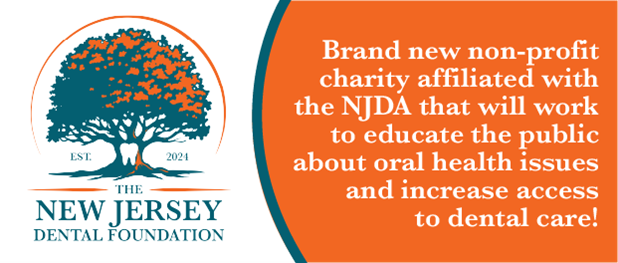Try the OmniChroma Family
Try a free sample of OMNICHROMA, OMNICHROMA Flow, or Flow BULK and see how one-shade composite can simplify your restorations.
Seller's Event | Bank of America
Planning your next chapter? This seminar is designed for established doctors, offering expert guidance to help you confidently transition your practice and prepare for retirement. Food and beverages provided.
The Wellness Summit
This intimate summit brings together dental professionals from across New Jersey for expert-led sessions, interactive discussions, and movement-based breaks focused on well-being, resilience, and burnout prevention. Attendees will gain practical tools to support their mental, emotional, and physical health in a supportive, judgment-free environment.
Renew Your Membership
Keep your support and member resources through 2026.
REGISTRATION OPEN!
We are excited to announce that NJDA's Annual Convention will return to Bridgewater on May 1-2, 2026! Registration is now open for this 2-day Convention that will truly be the place to be for all New Jersey dental professionals!
Celebrate NJDA President Dr. Amit Vora
Our yearly NJDA Celebration will cap off Day 1 of the Annual Convention and will take place at the Bridgewater Manor, located just seven minutes from the Convention site. We'll be celebrating New Jersey dentistry and our guest of honor, President Dr. Amit Vora. RSVP to join the celebration!
Enhance Your Membership
Customize your 2026 membership by adding the virtual License Requirements Series, our Practice Solutions bundle, or the new Dental Impact Series!
New Jersey Dental Foundation
Take a moment to learn more about NJDA's brand new initiative to help the public learn more and gain access to oral healthcare! Read the mission statement, governance, structure and more.
Helping Members Succeed
The New Jersey Dental Association is the voice of the dental profession and a strong proponent of oral health in the state. Members are part of a vibrant community of dentists encompassing 12 local dental societies as well as the American Dental Association. Members engage in educational programs, have access to dentist-centric relationships and tools to navigate the business of dentistry and their careers, as well as benefit from dedicated advocacy that protects the interests of the profession. The organization is run by member-dentists with the support of a team of professionals at NJDA Headquarters. NJDA members never practice alone!
UPCOMING EVENTS
DENTAL NEWS AND NOTES

Informed Consent -- More than Just a Form
Informed Consent: More Than Just a Form
By TDIC Risk Management Staff
A common allegation in many professional liability claims is the lack of informed consent. Patients argue that had they known about the possibility of complications, they would have made a different decision regarding their dental treatment. One of the best ways dentists can protect themselves in these cases is by ensuring patients are armed with the facts needed to make informed decisions.
Informed consent requires a dentist to explain the likelihood of success of a given procedure and its risks, benefits and alternatives. A dentist, not a staff member, must lead this conversation. The amount of time spent discussing options and answering a patient’s questions depends on the level of risk. Higher risk levels and more invasive treatments are two indicators that more time and detail should be spent informing the patient about the risks, benefits and alternatives to treatment, including no treatment at all.
“Informed consent is not a form. It is a conversation,” says John Sillis, attorney at Zaro & Sillis in Sacramento, Calif. “Whether you use consent forms for each procedure or write the information in the patient’s chart, you as the doctor must have some measure of a conversation with the patient about the risks, benefits and alternatives of the proposed treatment.”
Sillis says the discussion of risks, benefits and alternatives, or RBA, should be documented in the chart as “RBA discussed and questions answered” or “RBAQA.” To prove the discussion occurred, dentists are advised to establish a custom and a practice; that is, a habit in the way they practice. While a dentist may have trouble recalling the details of a specific case, they can convey the typical protocol that they would customarily employ for the procedure, even years later, Sillis added.
The Dentists Insurance Company reminds dentists that while informed consent discussions vary from treatment to treatment, information should always include the following:
- The nature of the recommended treatment
- The risks, complications and benefits of the recommended treatment, including the likelihood of success
- The alternatives to that treatment, including doing no treatment
- An explanation of the treatment plan’s expected sequence of events
Sillis recounts a case in which a dentist was sued for causing injury to the inferior alveolar nerve from a third molar extraction. The dentist had used a standard informed consent form that included nerve damage as a potential risk; however, the form did not include the potential for permanent injury to the nerve.
“Simply adding that term on the form would have successfully defended against that claim,” Sillis added.
In another case, a patient claimed the dentist performed root canal therapy unnecessarily. The teeth in question had received several restorations for recurrent caries. Though the risk of pulpal involvement was possible due to the extent of the old restorations, the dentist did not use a consent form nor did he document that he had discussed this possibility with the patient. The teeth remained symptomatic and required root canal therapy and the patient filed suit.
"The dentist could have avoided the suit by either having used a prepared consent form that included language that the treatment may not resolve the symptoms and may require additional treatment up to and including extraction, or simply had the discussion orally with the patient, including that information and then noted it in the chart, ‘RBA discussed.’” Sillis said.
According to TDIC, informed consent discussions are often complicated by language barriers. Should a patient be hearing impaired, the dentist is obligated to provide a sign language interpreter. If the patient speaks a language not spoken by the dentist, insurance providers are required to provide a translator. The practice of allowing minor children to translate for the parents can be problematic, so proceed with caution. It should also be noted that dentists cannot charge patients for a sign language interpreter, and dentists who are subject to ACA 1557, must provide for language translation.
TDIC also reminds dentists that only a legal guardian can provide consent for minor patients. For divorced parents, this means only the parent with legal custody. If in doubt, TDIC recommends requesting legal documentation of custody. Emancipated minors can provide their own informed consent.
Although patients ultimately decide which treatment avenues to take, their signed forms aren’t always enough to protect a dentist from liability. Patients cannot consent to substandard care, whether or not they sign forms, nor should a dentist practice below the standard of care at patients’ requests. Conversely, a dentist should not continue to treat patients who continue to refuse recommended treatment and should consider dismissing them from care following a formal dismissal protocol.
Procedure-specific informed consent forms are available to TDIC policyholders in multiple languages. To download, visit tdicinsurance.com/risk-management/informed-consent.
Making an informed decision is the right of every patient, but it is the responsibility of dentists to ensure patients have the comprehensive information needed to exercise that right. Patients have numerous options when it comes to their oral health, and only with thorough considerations of the risks, benefits and alternatives can they truly provide informed consent.
"Contact Us
Phone: 732-821-9400 or dial the Staff Directly
Fax: 732-821-1082 | Email: info@njda.org | Follow us @NJDentalAssoc
One Dental Plaza, North Brunswick, NJ 08902










